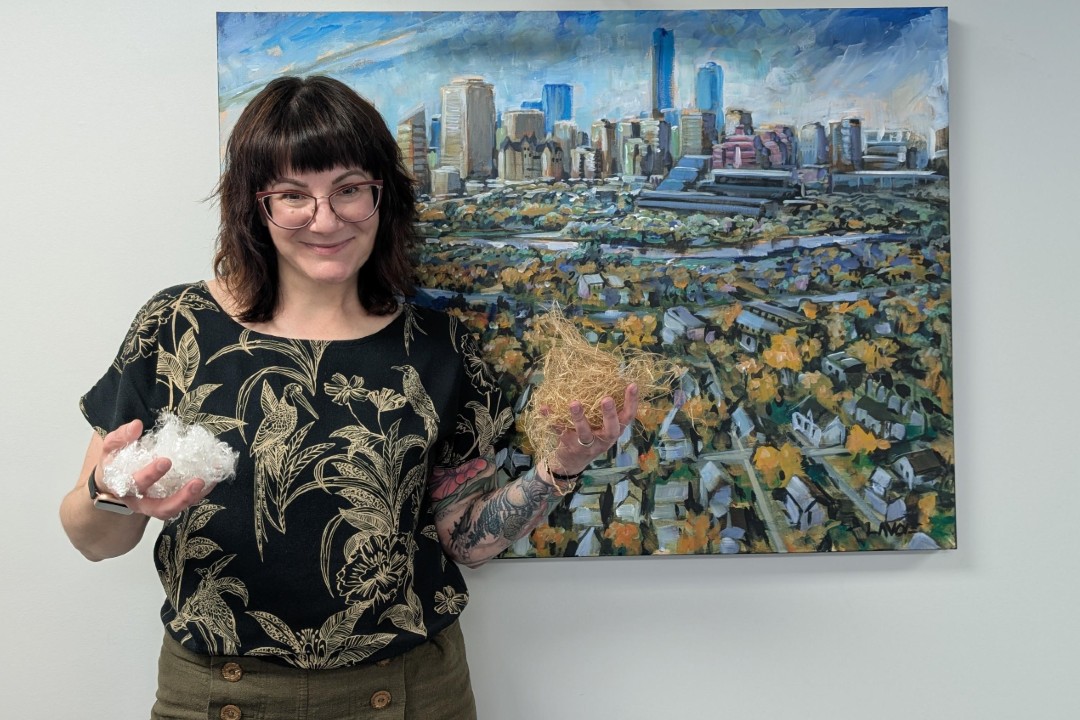Lelia Lawson, the founder and chief technology officer of Zylotex, is on a mission to build a new industry in the Edmonton region around fibres made from hemp.
"(The Edmonton region is a) part of the world where we have very long summer days," Lawson told Taproot. "We could get a very, very large biomass from hemp. If we do see that as a rotational crop here in Alberta, we could have an endless supply of feedstock for this process."
That process sees Zylotex apply a solvent to Alberta-grown hemp to transform the plant into a useable thread, called lyocell. Zylotex can make lyocell, which in turn can be used to manufacture everything from garments, dental floss, construction materials, and more, by using a solvent that's 99.7% recoverable. The solvent, n-methyl morpholine-N-oxide, or NMMO, is in turn far greener than the solvent used in the more common viscose process to create fibre from hemp, which contains carbon disulfide, Lawson said.
"The problem with carbon disulfide is it is toxic — it has been known to cause neurological issues in factory workers," she said. "It's extremely damaging to the environment as well, it's a carcinogen, and it poisons the waters."
Aside from heading the Zylotex startup, Lawson is the research and development specialist for Davey Textile Solutions, which manufactures industrial safety products at a 40,000-square-foot facility in Edmonton. That role informed her about how little fibre for textiles is actually produced in Canada, and ultimately led to creating the new company.
"Canada produces 0.2% of global fibres (annually)," said. "The majority of that is nylon. We do not produce, really, anything else of mention in Canada, so we do have the potential opportunity to manufacture here."
In 2022, Lawson said she was wondering if hemp might be able to create a fibre for Canada's textile industry, and spoke to Dan King, Davey's vice-president of production, and research and development. That conversation pushed her to enroll as a PhD candidate at the University of Alberta to figure out the answer. The university's Folio covered the resulting research last year.
Lawson recalled thinking at the time that if Canada could somehow figure out how to use the whole hemp plant, it could support the hemp economy, the bioeconomy, and create a rotational crop. She also recalled thinking that waste products from hemp processing could be commercialized in fibre production and fuel "a new industry in Canada."
She went on to create Zylotex with Davey's full support in April 2024.

Lelia Lawson, the founder and chief technology officer of Zylotex, poses alongside two fibre products made from hemp using the lyocell process. She sees hemp as a route to prosperity in a country that currently only produces 0.2% of the world's fibre. (Supplied)
Beyond the chemical process that Zylotex is working on, hemp's inherent qualities make it ideal to create a domestic fibre product, Lawson said. Canada, Alberta, and the Edmonton region have abundant farmland to grow hemp, it's already grown here for commercial applications, and it grows up to 10 centimetres per day on our long summer days. Plus, it's very difficult to grow fibre stock like cotton in Canada.
"I want to use hemp as a feedstock for the lyocell process, but if we can get pulping (or transforming raw plant materials into substances for products) of hemp down, in Alberta, then that pulp can also go into different industries," Lawson said.
The pharmaceutical and food industries could also benefit from greater adoption of hemp in manufacturing, she added. "The list goes on in terms of what we can do with this plant."
In March, Zylotex won the people's choice award as part of an Alberta Catalyzer Velocity cohort. Lawson credited a Zylotex win at the ASTech Awards by Technology Alberta as the tip of the scale to get the startup into the cohort, because it is earlier in development than the average cohort member. Davey Textiles, the U of A, Techfibre Industries, and Mark's were also recognized by the awards for their participation in the research that created Zylotex.
Davey has supported Zylotex since the startup's inception, but the startup is on its own as of July 1. While Lawson is "terrified" about the change, she said it's a natural development for the company.
"That's the life of an entrepreneur, right?"
Correction: This story has been updated to correct Lelia Lawson's name.
